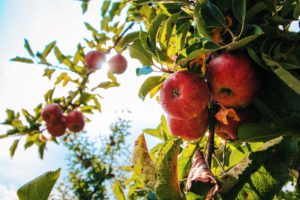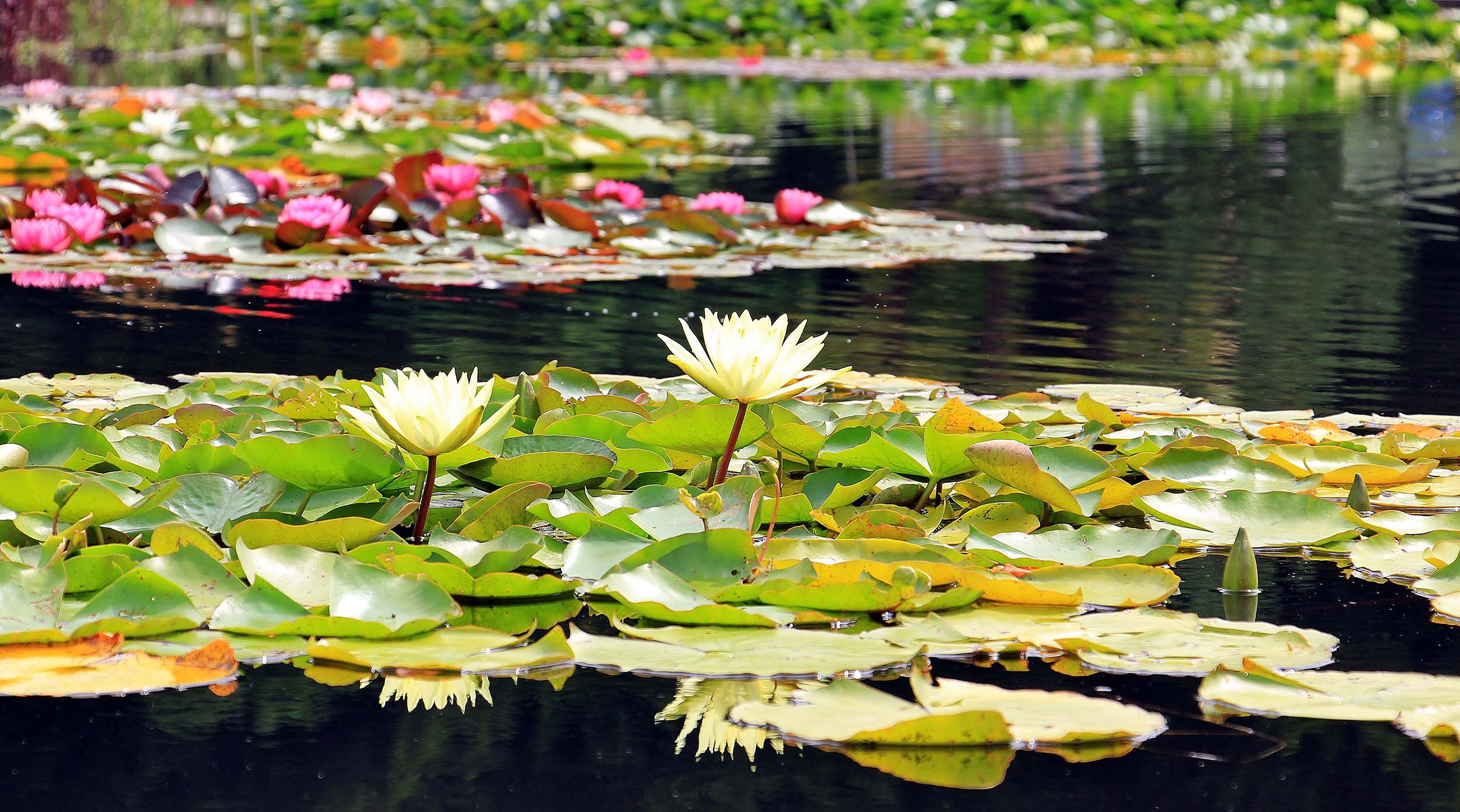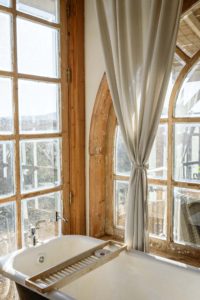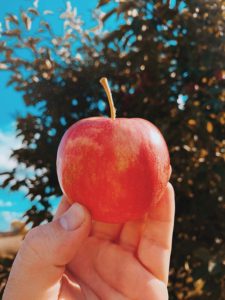
The trees in the orchard had low, gnarled branches, warmed and weighted with ripened fruit. Slowly she meandered through the trees, swinging under the branches as she passed by.
Beyond the orchard, the garden sloped up to the house. Maggie worked in its kitchens. She was new, sent up from the village. The cabbages she carried were for Cook’s soup. They’d been dug from the soil this morning. The basket was lined with straw from the stables. The red apple she’d picked for herself.
She shaded her eyes with a forearm. The house’s shutters were closed, but its drawing-room doors had been thrown open onto the veranda. A breeze billowed the white curtains. Beyond the doorway was dim and dark.
Faint through the air, a piano sang.
Do, re, mi, fa, so, la, ti—
Young Master was at his practice.
Maggie dangled her basket and leant against a pear tree. Its trunk was warm against her back. . Maggie widened her nostrils. The honey in the hive would soon be ready for harvesting. Her mouth watered at the thought.
Do, re, mi, called the notes. Fa, so, la—
Like a question, thought Maggie. Upwards they went towards a peak. She waited for the answer that came at the top, but each time the phrase broke off early. Maggie sucked her finger. There was dirt under the nail. Leaves tickled at the nape of her neck. She shifted her basket to the other hip. The red apple rolled against the rim.
Once, when she’d been out picking blackcurrants at the side of the lane, she’d seen Master riding out in his carriage. The mare in the traces had kicked up her hooves and tossed her head against the bit. The young master sat up very straight and didn’t look to the right or left.
“Drive on,” was all she heard him say. “Drive on!”
How fine he was! And so pale. She stood and stared long after the carriage disappeared, while the juice from the berries soaked through her apron.
Do, re, mi— Do, re, mi—
It left a tingle on the skin, him stopping short like that. Like an itch, you couldn’t quite reach. She rubbed her thumb back and forth beneath her collar. The cotton frill was damp and sticky. It really was very hot. She pushed herself off the pear tree and wandered up towards the house. The sun was bright across the veranda. The curtains lifted in the breeze.
Do, re, mi, fa, so, la, ti—
The piano stood in the grand drawing-room. The other day she’d cleaned it when the parlourmaid was sick. Its wood was black and shiny, with a varnish so thick you couldn’t see the grain. Its keys were like little white bones. She’d polished it all over with a yellow cloth until it gleamed. Then she pressed one fat, round fingerprint onto the lid.
Do, re, mi, fa, so, la—
The notes came clearer now, calling to her, drawing her up the garden. Why did he keep sticking so, she wondered? What was he waiting for? She thought again of his pale skin. Her own cheeks were hot. She wiped her brow as she climbed to the top of the lawn. How nice it would be to swim later in the lily pond, to slide down the mulchy bank into the cool waters. The lily pads were like great flat hands, their stalks below like fingers, plucking at your legs.


She supposed Young Master swam only in the bathtub. She pictured him lying on the white enamel beneath the stiff brass taps.
He played again the same stuck phrase. Again he broke off early. Maggie hitched up her basket and climbed the stone steps onto the veranda. She saw the dark shapes of furniture in the drawing-room. It was so dim and dreary in there. How stiff his fingers must be, how they must ache. She tugged at the laces on her bodice to let the air in. He should come outside and play a little, she thought. Her red apple shone in the sunshine.
The notes began again, half a step higher. Up and up they went with their little question.
She leaned against the veranda wall and thought of the stablehand she’d danced with at the summer festival. He smelled of straw and horses and another odour, sharp and spicy. His hands were big and hot, and they’d held her tight, stirring the bottom of her belly. Up and up the stirring went as the music jigged and they whirled about the room. When the dance was over, she laughed and fanned herself with her apron. The stablehand whispered a suggestion as he took her back to her seat.
Do, re, mi, fa—
And now, here was the Master, sticking on his scales. Why didn’t he play something else and let his fingers go a bit? She closed her eyes and lazed in the sunlight. A bluebottle tangled itself in the white curtains. She could hear it buzzing against the lace. She should get back to the kitchens Cook would be waiting, and the cabbages would get limp. She oughtn’t really have come up here. Cook would clap her ears if she knew.
The music stopped. A pregnant silence filled the air. The sun’s rays beat down from the zenith; Maggie felt their heat thick upon her eyelids. From far away came the whinnying of a horse. Indoors, all was still. She waited. Would he come, she wondered. Would he dare? The bluebottle buzzed again, banging against the glass.
At last, she heard a rustling of papers and the noise as the piano stool slid back. Footsteps came across the floor.
Maggie lifted her lashes.
They stared at each other, the boy and the girl.
His white shirt was buttoned right up under his chin and his golden curls were carefully parted. His upper lip showed a fine blonde down and his mouth was soft and pink beneath, like rose petals. He gazed down at her with round blue eyes.
Maggie felt brim-full. She stood in the doorway and rocked the basket on her hip. Her skirts swayed back and forth across the threshold. She sensed the stirring in him too, like sweet sap that ran beneath the tree bark. The syrup needed drawing out, she recalled, else it would clog and harden in the wood.
Maggie held out the red apple. Her arm was plump and browned by the sun.
“P’raps you be hungry, Sir, what with all yer exertions.”

The breeze blew and the bluebottle swooped free from the curtains. The blood bloomed in the master’s cheeks. He clenched his fists at his sides. His bottom lip trembled.
Maggie laughed and lifted the apple up towards him.
“Won’t ‘urt you, Sir,” she said.
He pulled in his chin.
“I don’t eat dirty vegetables,” he declared. He faltered and stared at Maggie and then the apple again. “And it’s time anyway for my nap.” He said, composing himself.
She swung the basket as she turned towards the kitchens. The cabbages were leafy and green. What good soup she and Cook would make, spiced with garlic and thickened with cream. She lifted the apple to her mouth and pressed its smooth skin against her teeth.
Perhaps later she would stop by the stables. After all, she’d said that she might, and she was full of such a stirring.
She imagined the master lying himself down in a narrow bed with the shutters tight closed—buried there in the sheets, as pale as a worm, with his clean hands plucking at the blankets. Yes, she decided. Pale all over.
She puckered her lips and whistled in full.
Do, re, mi, fa, so, la, ti, do!
The juice from the apple was as sweet as toffee. It filled all the corners of her mouth.
